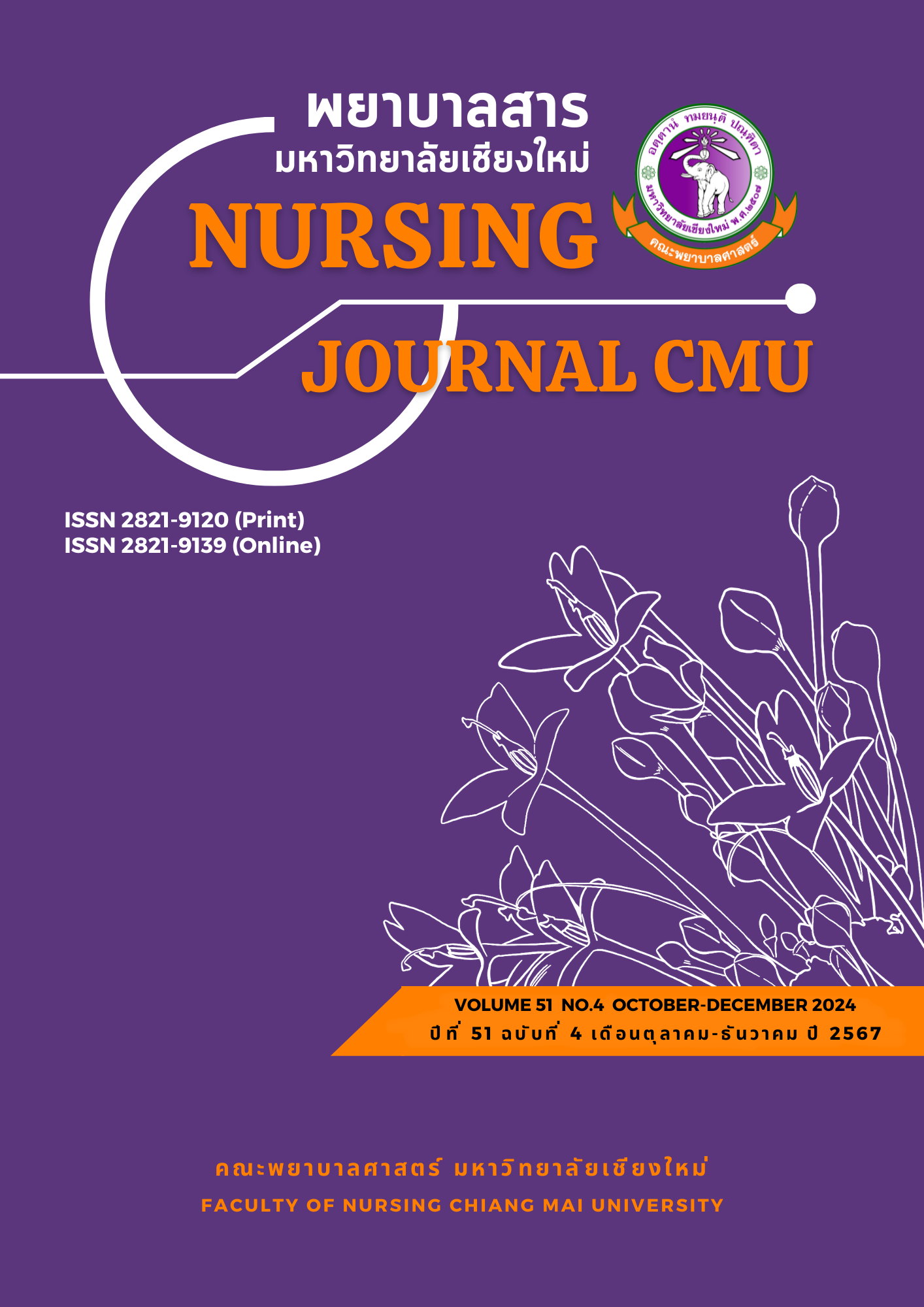Factors Predicting COVID-19 Vaccination Intention of Unvaccinated Older Adults in Phetchabun Province
Keywords:
Health belief model, Intention of COVID-19 vaccination, Older adults, Predicting factorsAbstract
The COVID-19 pandemic is a global outbreak affecting people around the world. COVID-19 vaccines are a significant tool for protection against the disease, reducing serious illness and death rates. This predictive correlational descriptive study aimed to determine COVID-19 vaccination intention and identify factors predicting COVID-19 vaccination intention among unvaccinated older adults. Independent variables included perceived susceptibility to COVID-19, perceived seriousness of COVID-19, perceived benefits of COVID-19 vaccines, perceived barriers to COVID-19 vaccination, received recommendations from healthcare providers, and knowledge about COVID-19. The Health Belief Model was used as a theoretical framework. Participants were 120 unvaccinated older adults living in Chondaen district, Phetchabun province, who were recruited using convenience and snowball sampling approaches. Data were analyzed using logistic regression analysis.
Results demonstrated that the mean intention score of unvaccinated older adults was 3.57 (SD = 3.18), ranging from 0 to 10. Increased perceived susceptibility to COVID-19 was significantly associated with an increased possibility of COVID-19 vaccination intention among older adults (OR = 1.48, 95% CI = 1.02-2.13). Increased perceived benefits of COVID-19 vaccines were significantly associated with an increase in the likelihood of COVID-19 vaccination intention among older adults (OR = 1.33, 95% CI = 1.01-1.77). Perceived severity of COVID–19, perceived barriers to COVID–19 vaccination, received recommendations from health care providers, and knowledge about COVID-19 did not predict COVID-19 vaccination intention among older adults.
Findings from this study provide basic information and direction for nurses and healthcare providers in designing health services to promote the uptake of COVID-19 vaccines among unvaccinated or incompletely vaccinated older adults to reduce severe illness and deaths.
References
Ajzen, I. (1991). The theory of planned behavior. Organizational Behavior and Human Decision Processes, 50(2), 179–211. https://doi.org/10.1016/0749-5978(91)90020-T
Austin, P. C., & Steyerberg, E. W. (2017). Events per variable (EPV) and the relative performance of different strategies for estimating the out-of-sample validity of logistic regression models. Statistical Methods in Medical Research, 26(2), 796-808. https://doi.org/10.1177/0962280214558972
Chiangmai Provincial Public Health Office. (2018). Health screening guide for the elderly health promotion. Chiangmai Provincial Public Health Office. (in Thai)
Department of Disease Control. (2021). Vaccine COVID-19. Department of Disease Control. (in Thai)
Department of Disease Control. (2022). COVID-19. https://ddc.moph.go.th/odpc5/news.php?news=28701&deptcode=odpc5 (in Thai)
Department of Disease Control. (2023). Situation COVID-19. https://ddc.moph.go.th/viralpneumonia/situation_more.php (in Thai)
Duangkaew, T., & Sirasoonthorn, P. (2017). An application of Marshall H. Becker’s health belief model (HBM) in the study of hypertension patient in urban communities in Phitsanulok. Journal of Community Development Research (Humanities and Social Sciences), 10(3), 101-113. https://www.journal.nu.ac.th/JCDR/article/view/1951/1160 (in Thai)
Fernandes, N., Costa, D., Costa, D., Keating, J., & Joana, A. (2021). Predicting COVID-19 vaccination intention: The determinants of vaccine hesitancy. Vaccine 2021, 9(10), 1161. https://doi.org/10.3390/vaccines9101161
Huynh, G., Tran, T. T., Nguyen, T. N., & Pham, L. A. (2021). COVID-19 vaccination intention among healthcare workers in Vietnam. Asian Pacific Journal of Tropical Medicine, 14(4), 159-164. https://doi.org/10.4103/1995-7645.312513
Khumsaen, N. (2021). Knowledge, attitudes, and preventive behaviors of COVID-19 among people living in Amphoe U-thong, Suphanburi Province. Journal of Prachomklao College of Nursing, Phetchaburi Province, 4(1), 33-48. https://he01.tci-thaijo.org/index.php/pck/article/view/247955/168669 (in Thai)
Lin, Y., Hu, Z., Zhao, Q., Alias, H., Danaee, M., & Wong, L. P. (2020). Understanding COVID-19 vaccine demand and hesitancy: A nationwide online survey in China. PloS Neglected Tropical Diseases, 14(12), e0008961. https://doi.org/10.1371/journal.pntd.0008961
Mahmud, I., Kabir, R., Rahman, M. A., Al-Mohamed, A., Vinnakota, D., & Al-Mohaimeed, A. (2021). The health belief model predicts intention to receive the COVID-19 vaccine in Saudi Arabia: Results from a cross-sectional survey. Vaccines, 9(8), 864. https://doi.org/10.3390/vaccines9080864
Malesza, M., & Wittmann, E. (2021). Acceptance and intake of COVID-19 vaccines among older Germans. Journal of Clinical Medicine, 10(7), 1388. https://doi.org/10.3390/jcm10071388
Ministry of Public Health. (2023). COVID-19. https://dmsic.moph.go.th/index/detail/9238 (in Thai)
Pfeiffer, E. (1975). A short portable mental status questionnaire for the assessment of organic brain deficit in elderly patients. Journal of the American Geriatrics Society, 23(10), 433-441. https://doi.org/10.1111/j.1532-5415.1975.tb00927.x
Rosenstock, I. M. (1974). Historical origins of the health belief model. Health Education Monographs, 2(4), 328-335. https://doi.org/10.1177/109019817400200403
Ruiz, J. B., & Bell, R. A. (2021). Predictors of intention to vaccinate against COVID-19: Results of a nationwide survey. Vaccine, 39(7), 1080-1086. https://www.sciencedirect.com/science/article/pii/S0264410X21000141
Sallam, M. (2021). COVID-19 vaccine hesitancy worldwide: A concise systematic review of vaccine acceptance rates. Vaccines, 9(2), 160. https://doi.org/10.3390/vaccines9020160
Sela, J., Ratcha, M., Surach, A., Nakju, S., & Samranjit, S. (2021). New normal lifestyle in prevention of COVID-19 pandemic among in Bangkok. Journal of Sakon Nakhon Hospital, 24(2), 58-73. (in Thai)
Shmueli, L. (2021). Predicting intention to receive COVID-19 vaccine among the general population using the health belief model and the theory of planned behavior model. BMC Public Health, 21(1), 804. https://doi.org/10.1186/s12889-021-10816-7
Ui-eng, S. (2022). Factors affecting the decision to COVID-19 booster vaccine (third dose) among older people in area of Muang District, Songkhla. Journal of Songkhla Hospital, 1, 1-14. https://www.skhospital.go.th/wp-content/uploads/2022/12/journal-20221223.pdf (in Thai)
World Health Organization Thailand. (2020). COVID-19. World Health Organization Thailand. (in Thai)
Yanez, N. D., Weiss, N. S., Romand, J. A., & Treggiari, M. M. (2020). COVID-19 mortality risk for older men and women. BMC Public Health, 20(1), 1742. https://doi.org/10.1186/s12889-020-09826-8
Zhong, B. L., Luo, W., Li, H. M., Zhang, Q. Q., Liu, X. G., Li, W. T., & Li, Y. (2020). Knowledge, attitudes and practices towards COVID-19 among Chinese residents during the rapid rise period of the COVID-19 outbreak: A quick online cross-sectional survey. International Journal of Biological Sciences, 16(10), 1745–1752. https://doi.org/10.7150/ijbs.45221
Downloads
Published
How to Cite
Issue
Section
License
Copyright (c) 2024 Nursing Journal CMU

This work is licensed under a Creative Commons Attribution-NonCommercial-NoDerivatives 4.0 International License.
บทความที่ได้รับการตีพิมพ์เป็นลิขสิทธิ์ของวารสารพยาบาลสาร
ข้อความที่ปรากฏในบทความแต่ละเรื่องในวารสารวิชาการเล่มนี้เป็นความคิดเห็นส่วนตัวของผู้เขียนแต่ละท่านไม่เกี่ยวข้องกับมหาวิทยาลัยเชียงใหม่ และคณาจารย์ท่านอื่นๆในมหาวิทยาลัยฯ แต่อย่างใด ความรับผิดชอบองค์ประกอบทั้งหมดของบทความแต่ละเรื่องเป็นของผู้เขียนแต่ละท่าน หากมีความผิดพลาดใด ๆ ผู้เขียนแต่ละท่านจะรับผิดชอบบทความของตนเองแต่ผู้เดียว






